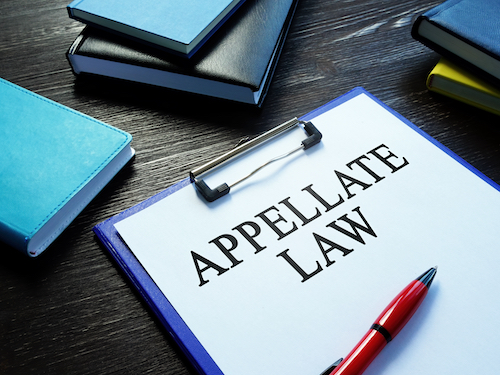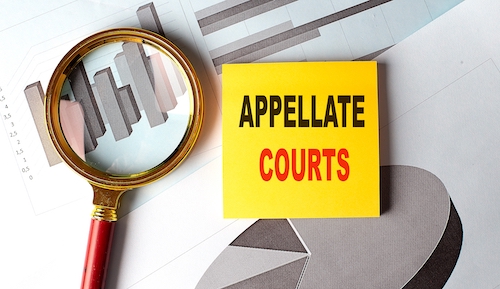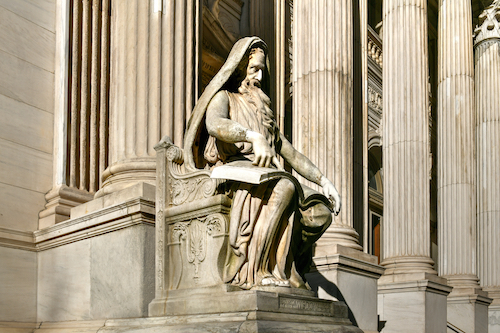
Supersedeas is a Latin term meaning “you shall desist.” Appropriately, a writ of supersedeas is a request for a court to stay enforcement of a judgment pending appeal. There are detailed guidelines for petitioning the court for a writ of supersedeas. But the writ can be useful for temporarily suspending the trial court’s authority to enforce judgments.
Likewise, the non-petitioning party should know whether to oppose this writ and how. Gusdorff Law’s appellate practice team explains.
When trial courts issue judgments or orders, they may generally be enforced right away. However, the losing party could decide to appeal the case. In tandem with the appeal, the appellant may want to stay enforcement of the trial court judgment. This is where the writ of supersedeas comes in.
The appellant will file a verified petition in the California Court of Appeal. The petition must include a memorandum that explains the necessity of the request. The petitioner must show that it will suffer irreparable harm without the stay. The injury suffered because of a stay must be demonstrably greater than the injury to the opposing party.

If the record on appeal has not been filed, the petition must include a statement of the case. The memorandum has to include a fair summary of the material facts and the issues likely to be raised on appeal. The appellant must be able to show the ability to raise substantial issues on appeal.
Along with the petition, the appellant must file:
A copy of the judgment or order, showing its date of entry.
A copy of the notice of appeal, showing the date of filing.
A transcript of oral statements by the court. These statements must support the court’s rulings related to the issues that are likely to be raised on appeal. If a transcript is unavailable, a declaration fairly summarizing any such statements must be filed.
Any application for a stay filed in the trial court and any opposition to that application. Also, a reporter’s transcript of the oral proceedings concerning the stay. If a transcript is unavailable, a declaration fairly summarizing these proceedings must be filed.
Any other trial court document that is necessary for consideration of the petition.
There are additional rules regarding these documents. They touch on page length, page numbering, indexing, and more.
If you would like to learn more about appellate law’s most underrated tool, view this page .
If you were the prevailing party in the trial court, you won’t agree with the petition. But should you oppose it? As mentioned above, the petitioner must be able to demonstrate certain elements. For one, the petitioner must show substantial injury would result if the writ is not issued. And it must outweigh any harm to the party opposing the writ.
Therefore, the non-petitioning party may file an opposition if the writ would cause undue harm.
The opposing party has 15 days after the petition is filed to file and serve an opposition to it. The opposition must state any material facts not included in the petition. It must also include its own memorandum. The Court of Appeal may not issue a writ until the respondent has had the opportunity to file an opposition.
The Court of Appeal has the power to issue a writ of supersedeas on any conditions it deems just. If a writ is issued, the Court of Appeal must notify the trial court.
Gusdorff Law represents parties who want trial court judgments to be executed immediately. But it’s helpful to understand writs of supersedeas, how to file them, and how to oppose them. We know the complexities of the rules surrounding these writs. Have questions about them? Let us advise you today. Supersedeas is a Latin term meaning “you shall desist.”
Appropriately, a supersedeas bond is a request for a court to stay enforcement of a judgment pending appeal. There are detailed guidelines for petitioning the court for a writ of supersedeas.
This writ can be useful for temporarily suspending the trial court’s authority to enforce judgments. Similarly, the non-petitioning party should know whether to oppose this writ and how. Gusdorff Law’s appellate practice team explains.

When trial courts issue judgments or orders, they may generally be enforced right away. However, the losing party might decide to appeal the case. In tandem with the appeal, the appellant may want to stay the enforcement of the trial court judgment. This is where the supersedeas bond comes in.
Steps to File:
Additional Requirements:
There are additional rules regarding these documents, including page length, page numbering, and indexing.
Specific Circumstances:
If you were the prevailing party in the trial court, you likely won’t agree with the petition. But should you oppose it? The petitioner must demonstrate that substantial injury would result if the writ is not issued, and that this injury outweighs any harm to the party opposing the writ. Therefore, the non-petitioning party may file an opposition if the writ would cause undue harm.
Filing an Opposition:
The Court of Appeal has the power to issue a supersedeas bond on any conditions it deems just. If a writ is issued, the Court of Appeal must notify the trial court.

When appealing a case, a supersedeas bond (also known as an appeal bond) is typically required to stay the enforcement of a money judgment pending appeal. This bond acts as a financial guarantee that the appellant will satisfy the judgment amount, including any accrued interest and court costs, if the appeal is unsuccessful.
Components of a Supersedeas Bond
Benefits of Supersedeas Bonds
Before proceeding, it’s essential to understand the specific supersedeas bond requirements:
Choose a Surety Company
Select a reputable surety company to issue the supersedeas bond. The surety company will evaluate the appellant’s financial status and the details of the case before issuing the supersedeas bond.
Complete Bond Application
Submit an application detailing the judgment amount and other necessary financial information. The application process typically involves:
Provide Collateral
In some cases, the surety company may require collateral to secure the supersedeas bond. This could include cash, real estate, or other valuable assets.
Pay the Premium
Make the necessary premium payment to activate the supersedeas bond. The bond premium is usually a percentage of the bond amount and is paid upfront.

Staying the execution of a judgment is crucial in the appeals process. It ensures that the judgment is not enforced while the appeal is pending, which can be beneficial for the appellant. This stay can prevent the judgment creditor from collecting the judgment amount, thereby avoiding financial strain on the appellant.
The appellate court reviews the lower court’s decision to determine if there were any legal errors. During this review, the supersedeas bond serves as a safeguard, ensuring that the judgment creditor is protected if the appellant does not succeed in the appeal.
The appellate court may:

Gusdorff Law represents parties seeking to execute trial court judgments immediately or those looking to stay enforcement pending appeal. Our expertise in supersedeas bonds, appeal bonds, and appellate procedures ensures that you receive comprehensive guidance throughout the appeals process.
Contact us today to discuss your case and learn how we can assist you in navigating the complexities of appellate law. Don’t leave your appeal to chance—let Gusdorff Law help you secure the best possible outcome.
Contact Gusdorff Law now at 818-877-4515 for expert advice on supersedeas bonds and to ensure your rights are protected during the appeals process.